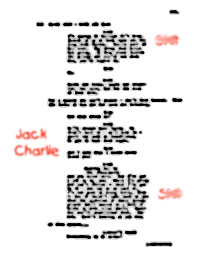Page 1 Page 2

His arrival was preceded by his reputation. Ziggy was a legendary hell-raiser. Not your old style boozer: the open a bottle of Scotch and throw away the top because it won’t be needed again. Ziggy was into everything.
“Every day: four grams of coke, two bottles of tequila and a couple of six packs to wash it down,” he boasted on The Daily Show.
“Why do you do it? Jon Stewart asked. “Is it some sort of crutch?”
“Hell no. It gives me wings. Unnerstand what I’m saying, man?”
“Weren’t you in the Betty Ford last year?”
“Not for drugs, notfordrugs,” Ziggy sniffed. “I was there for sex addiction.”
I had watched in admiration. His publicist had translated a coup de grâce into a coup. Ziggy’s wife had saved face and wouldn’t need to leave him because of his serial infidelities. Ziggy was not a bad man; he was now a sick man trying to get better. Ziggy was now a stud. His attractiveness to both male and female fans had doubled in gauss.
But, in fact, the insiders knew he had been diagnosed as having an addictive personality. And in order to ever make a film again in the States, he had to be insured. The insurers insisted he had to dry out, clean up, shape up, keep his pants up. In technical terms, “get his shit together.” Starring in our film was his last chance.
When he arrived on location in the Scottish Highlands, his greasy leather Stetson covered his piercing blue eyes, and he completely lacked charisma. And he mumbled. Repetitively. Finally, I made out, “Where are my lines?”
I got the continuity woman to give him another copy of the script. But that still didn’t satisfy him. “Where’s my publicist? I need my publicist.”
“We’ll do publicity after postproduction,” I explained. Then the shock — he wanted points, ten percent of the profits. He was taking advantage of the fact this was my first feature, and I needed it desperately as a calling card for my ambition to work in Hollywood. And he knew — everyone knew — it was Ziggy’s name attached to the film that made the whole thing possible. I explained how everyone was working on a deferred payment basis only and elicited enough sympathy from him that he finally accepted five. Then came the aftershock.
“And that’s five percent of the gross.” He hitched up his fringed leather jacket. “I know how accountants can be great magicians and make net profits disappear.”
Finally, the drizzle stopped, and Ziggy was in place beside the loch and the female romantic interest and ready to start filming. But on the director’s call of “action,” there was none. Ziggy just stood there lethargic and mute. The director looked at Ziggy. Ziggy looked at the director. The director raised his eyebrows in a question, and Ziggy raised his. They continued looking at one another. It was a standoff. So I intervened before the director blinked and lost face and authority. “Is there a problem?” I asked as I, in turn, looked at Ziggy.
“Where are my lines? I have to have my dialogue written on large cards.”
The crew looked on in amazement. “It’s what Brando did when I worked with him,” he continued in a hurt tone.
I surreptitiously shook my head at the director. Don’t react. But he didn’t see, or chose not to see as he said, “But you only have ten words in this scene. And they are simple, short and easy to say.”
“I don’t memorize lines. I just don’t do that. My mind is full of poetry. That’s what I use it for. I won’t pollute it with this shit.”
I wrote out the idiot boards and, after a lot of takes, we had the establishing shots and the two-shots in the can and broke for lunch in the local pub.
Ziggy disappeared for an hour before it was time for the close-ups. He seemed to want to talk to me whenever he wasn’t needed in front of the camera. He still mumbled about lines.
“How do you think the film will be received in the States?” I asked to change the subject. If it got distributed there, we would be made.
“Don’t ask me, man. I don’t know how it will turn out. You’re very young to be a producer.”
“I mean, just on your reading of the script.” I ignored the dig about my age. “What do you think of it?”
“I don’t read scripts, man. I read my part, and it looks good.”
I couldn’t believe what I’d heard, and it must have shown.
He went on, “I keep it real. My character wouldn’t know what happens in scenes he’s not in. And I sure as hell don’t read other people’s dialogue. How the hell could my character see into their heads or see into the future and know what they are going to say to me?”
“But don’t you need to know the overall tone of the piece, the film genre, the character’s arc? So you know how to play him?”
“It should all be in my dialogue and the scene direction below the slug line. If not, it’s a bad script.”
He was right in theory, although most actors seemed to ignore scriptwriters’ helpful directions. Then he delivered the knockout blow. “Anyhow. I still don’t have the third act. How am I supposed to know the film’s genre if the screenplay isn’t even written? How DOES it end?”
“It’s a mystery.”
Page 1 Page 2
Pages: 1 2

